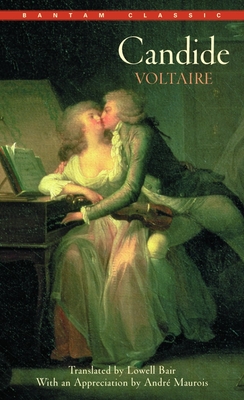In a satire against the optimism of Leibniz, Candide has its young philosopher traveling the world searching for his love and attempting to see if his tutor Pangloss is correct in that this world is the best of all possible worlds that God could have created.
The story begins as Candide is expelled from the Edenic castle in Westphalia for his scandalous kiss to the baroness, the fair Cunegonde. He travels across continents meeting a variety of common people and royalty; priests and sinners; wealthy and poor. Candide continues to struggle with the question of whether Pangloss (and ultimately Leibniz) is correct that this world, the one filled with greed and murder and hypocrisy and cruelty, is the best possible one out of the mind of God. He fights with what he believes and what he sees, and cannot justify the two. Candide is left to “cultivate his garden” rather than waste any more time thinking through these issues.
For the Christian, this book explores one of the key objections to a theistic faith: how can a good God allow suffering in this world? While that question is not specifically addressed, is it at the heart of Candide’s uneasiness. What happens when our world is filled with pain, disappointment, and horror? Can we reconcile a God with our life experience? This is a topic that Christians must not only address to those around who question the claims of Christianity, but we must also have an answer for ourselves when the horrors come.
It would be the height of hubris to state a simple answer to this issue, but we must begin our search for one in the gospel itself. We must remember that God the Father knows suffering and murder, as his Son hung on the cross to die for the sins of the world. He watched as Jesus was tortured and killed to become the payment for sins that we not his own. When we are trying to justify a good God with suffering, our question must begin with God himself. Candide met a cast of characters spewed from the bowels of humanity, but never discussed sin.
Christian doctrine teaches that Adam’s sin brought this world from perfection to the wastelands with people corrupted in the downward spiral. Leibniz’s optimism is wrong: this world is depraved and men have the capability to act like animals to one another. Candide’s observations should bring us back to the God who has provided his Son as a sacrifice to restore humanity to our true image-bearer state. The murderers, the rapists, the thieves in Candide’s journey point us back to a God, one who is perfect because we see that man is not. Corrupt men in the world show a moral structure beyond us that defines what corrupt men act like.
Candide’s decision to focus only on his own garden shows a hopelessness that Christians ought not have. Even in the light of pain and difficulty, we should see our “gardens” in light of the larger garden, the only that has the Tree of Life swaying. Because of this, we can have hope in that other world that is the best of all possible worlds.

 About
About